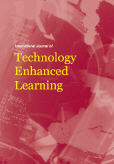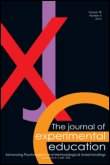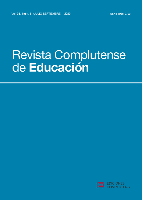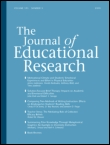
Eurasian Journal of Educational Research
Scope & Guideline
Fostering collaboration and knowledge in education.
Introduction
Aims and Scopes
- Innovative Pedagogical Approaches:
The journal emphasizes research on new and effective teaching methods, including project-based learning, flipped classrooms, and the use of gamification to enhance student engagement and learning outcomes. - Educational Leadership and Management:
It explores various leadership styles and their impact on educational institutions, focusing on how effective leadership can improve teaching quality and institutional performance. - Integration of Technology in Education:
The journal highlights the role of technology, such as artificial intelligence, e-learning platforms, and digital tools, in transforming educational practices and enhancing learning experiences. - Cultural and Contextual Factors in Education:
Research addressing the influence of cultural traits and socio-economic factors on educational practices, particularly in diverse educational settings across Eurasia, is a core focus. - Student Well-Being and Development:
The journal aims to understand factors affecting student well-being, including mental health, resilience, and emotional intelligence, and their relationship to academic success.
Trending and Emerging
- Mental Health and Well-Being in Education:
There is an increasing emphasis on the mental health and emotional well-being of students, highlighting the importance of supportive educational environments and strategies to enhance resilience. - Use of Artificial Intelligence and Big Data:
Research exploring the integration of AI and big data analytics in educational settings is on the rise, reflecting a growing interest in personalized learning and data-driven decision-making. - Culturally Responsive Pedagogy:
Emerging studies focus on culturally responsive teaching practices that acknowledge and incorporate students' diverse backgrounds, fostering inclusivity and equity in education. - Impact of COVID-19 on Education:
The pandemic has sparked extensive research into the challenges and adaptations in education, particularly regarding online learning, hybrid models, and the overall impact on teaching and learning dynamics. - Sustainability and Environmental Education:
There is a notable trend towards incorporating sustainability into educational practices, emphasizing the role of education in fostering environmental awareness and responsible citizenship among students.
Declining or Waning
- Traditional Teaching Methods:
There is a noticeable reduction in studies focusing on conventional teaching methods, as the emphasis has shifted towards innovative and technology-enhanced learning strategies. - Standardized Testing and Assessment:
Research related to standardized testing practices is becoming less common, as educators and researchers seek more holistic and formative assessment approaches that cater to diverse learning needs. - Disciplinary Boundaries in Education Research:
The journal has seen a decline in research strictly confined to traditional disciplinary boundaries, with a growing trend towards interdisciplinary approaches that integrate various fields of study. - Teacher-Centered Learning:
Themes centered around teacher-led instruction are waning, as there is a stronger focus on student-centered learning and active participation in the educational process.
Similar Journals

International Journal of Technology Enhanced Learning
Bridging the Gap Between Technology and Effective LearningInternational Journal of Technology Enhanced Learning, published by INDERSCIENCE ENTERPRISES LTD, is a premier scholarly journal that comprehensively explores the intersection of technology and education, fostering innovative approaches to enhance learning processes. Established in 2008 and continuing through 2024, the journal is pivotal for researchers, educators, and technology professionals aiming to disseminate and engage with cutting-edge developments in technology-enhanced learning environments. With an admirable ranking in Scopus—placing in the 72nd percentile of Education and 49th in Computer Science Applications—the journal reflects a robust influence in the fields of Computer Science Applications and Education, as evidenced by its Q2 and Q3 quartile rankings. The journal not only provides a platform for empirical research and theoretical discourse but also emphasizes practical implementations in e-learning. Although it does not offer open access, its curated collection of articles serves as a vital resource for scholars and practitioners who are dedicated to advancing the nexus of technology and education.

Advanced Education
Empowering Educators with Cutting-Edge ResearchAdvanced Education is a distinguished open-access journal dedicated to the interdisciplinary study of educational methodologies and innovations, published by the National Technical University of Ukraine - Kyiv Polytechnic Institute, Faculty of Linguistics. Since its inception in 2014, the journal has endeavored to disseminate high-quality research findings and theoretical work that contribute to advancements in educational practices and policy-making. With the increasing need for accessible education resources in our rapidly evolving global landscape, Advanced Education plays a critical role in bridging gaps between linguistic studies and educational technology, providing a platform for scholars, educators, and practitioners to share their insights. The journal aspires to enhance educational quality and effectiveness, making it an indispensable resource for researchers, professionals, and students engaged in the field of education.

Profesorado-Revista de Curriculum y Formacion de Profesorado
Connecting Research and Practice in EducationProfesorado-Revista de Curriculum y Formacion de Profesorado is a prominent academic journal dedicated to advancing the fields of curriculum studies and teacher education. Published by the esteemed Universidad de Granada's Grupo Investigación FORCE, this Open Access journal has been fostering scholarly communication since 1998, ensuring that research is easily accessible to a global audience. With an ISSN of 1138-414X and an E-ISSN of 1989-6395, it is a respected voice in the education community, currently rated Q3 in Education for 2023, showcasing its relevance and contribution to the discipline. The journal encompasses a wide range of topics related to pedagogy, curriculum development, and teacher professional development, aiming to provide innovative insights and promote best practices among educators. Its Scopus ranking reflects its standing in the field, placing it at #793 out of 1543 in the Social Sciences - Education category, in the 48th percentile, indicating a competitive niche within academic research. Based in Granada, Spain, this journal plays a crucial role in bridging educational theory and practice, making it an essential resource for researchers, practitioners, and students committed to enhancing educational experiences.

JOURNAL OF EXPERIMENTAL EDUCATION
Pioneering insights for a brighter educational future.Journal of Experimental Education, published by Routledge Journals, Taylor & Francis Ltd, is a prestigious platform dedicated to advancing the field of educational research. With an impressive history spanning from 1932 to 2024, this journal covers significant developments in Developmental and Educational Psychology and Education, achieving a Q1 ranking in both categories for 2023. The journal is recognized for its rigorous peer-reviewed articles that explore innovative experimental methodologies and empirical studies that shape contemporary practices in education. Current Scopus rankings further establish its credibility, placing it in the top percentiles among its peers. While it is not an open-access journal, the insights offered through its publications are invaluable for researchers, educators, and students seeking to deepen their understanding of educational phenomena and improve pedagogical approaches. By fostering a community dedicated to research excellence, the Journal of Experimental Education serves as an essential resource for those committed to the advancement of education.

Technology Knowledge and Learning
Connecting Theory and Practice in the Digital AgeTechnology Knowledge and Learning, published by SPRINGER, stands as a pivotal platform in the realms of computational theory, computer science, education, and human-computer interaction. With an impressive impact factor reflecting its reputation, this journal has consistently ranked in the Q1 quartile across multiple categories as of 2023, including Computational Theory and Mathematics, Education, and Engineering. Spanning a timeline from 2011 to 2024, it serves as an essential resource for those engaged in exploring the intersections of technology, pedagogy, and knowledge transfer, thereby facilitating advancements in both theory and practical applications. Although it is not an open-access journal, the rigorous peer-review process ensures that only the highest quality research contributes to its esteemed reputation. By providing a platform for innovative research and discussions, Technology Knowledge and Learning plays a crucial role in shaping the future of technological education and applications, making it an invaluable resource for researchers, professionals, and students alike, seeking to stay at the forefront of this dynamic field.

Revista Complutense de Educacion
Connecting Scholars to Transform Educational LandscapesRevista Complutense de Educación is a prominent academic journal published by Universidad Complutense de Madrid, specifically from their Servicio de Publicaciones. With an ISSN of 1130-2496 and an E-ISSN of 1988-2793, this open-access journal has been disseminating knowledge in the field of education since 1990, making it a valuable resource for researchers, educators, and practitioners alike. The journal encompasses a wide array of topics pertinent to educational theory, practice, and innovations, and has established its credibility in the academic community, as reflected in its Q3 ranking in the field of Education according to Scopus. Ranked #673 out of 1543 in the Social Sciences Education category, with a 56th percentile ranking, it serves as a vital platform for scholarly discourse and the sharing of cutting-edge research. With a convergence of contributions from 2009 to 2024, the Revista Complutense de Educación continues to enhance the landscape of educational research, promoting a better understanding of contemporary educational challenges and solutions.

Journal of Teaching and Learning
Empowering educators with evidence-based insights.The Journal of Teaching and Learning, published by the University of Windsor, Faculty of Education, is a prominent open-access journal in the field of education, dedicated to fostering scholarly discussion and exploration. Since its inception in 2001, it has served as a vital platform for researchers, educators, and practitioners to share innovative insights and evidence-based practices that advance teaching and learning methodologies. With an impact factor reflective of its category quartiles, it currently ranks in the Q3 category for education according to the 2023 evaluation, standing at 834 out of 1543 in Scopus's social sciences education rankings. This journal aims to bridge theoretical frameworks with practical applications, providing a robust resource for those invested in enhancing educational outcomes. With an open-access model, the Journal of Teaching and Learning ensures that its contributions are readily accessible to a global audience, encouraging the dissemination of knowledge and collaborative learning experiences. The journal is published in Canada and welcomes submissions that explore current trends and future directions in teaching practices, learner engagement, and educational policy.

Pegem Egitim ve Ogretim Dergisi
Advancing Educational Insights for Tomorrow's LeadersPegem Egitim ve Ogretim Dergisi is a prominent academic journal published by PEGEM AKAD YAYINCILIK EGITIM DANISMANLIK HIZMETLERI TIC LTD STI, specializing in the field of education. Based in Turkey, this journal offers a platform for scholarly discourse, catering to both emerging and established researchers in the educational domain. With its ISSN 2148-239X, the journal aims to provide insights into contemporary educational practices, pedagogical innovations, and research findings that influence teaching and learning. Although classified in the Q4 quartile of the education category as of 2022 and achieving a Scopus rank of 1178 out of 1469, it remains a valuable resource for practitioners and academics alike. The journal ceased Scopus coverage in 2023, yet it continues to be a relevant outlet for educational research in Turkey and beyond. While it operates under traditional access models, the potential for collaborative research and knowledge sharing makes it a noteworthy choice for those engaged in the evolving landscape of education.

JOURNAL OF EDUCATIONAL RESEARCH
Shaping policies with cutting-edge educational findings.JOURNAL OF EDUCATIONAL RESEARCH is a premier publication in the field of education, disseminating high-quality research findings that inform practices, policies, and developments in educational settings. Published by Routledge Journals, Taylor & Francis Ltd, this journal carries a strong reputation with an impact factor that reflects its influence in the academic community. With a history that spans over a century, from 1920 to 2024, the journal has established itself as a key resource, achieving a noteworthy Q2 ranking in the education category and residing within the top 70th percentile according to Scopus rankings. It primarily focuses on empirical studies, reviews, and theoretical discussions that contribute to the understanding of educational phenomena. The journal does not currently offer open access options but remains highly regarded within the scholarly community as a vital source for researchers, practitioners, and students interested in advancing educational practices and policies.

Journal of E-Learning and Knowledge Society
Transforming Knowledge Exchange in the Digital AgeJournal of E-Learning and Knowledge Society is a premier academic journal dedicated to the exploration and advancement of e-learning and knowledge dissemination in contemporary society. Published by the SOC ITALIANA E-LEARNING, this journal has established itself as a vital resource for researchers and practitioners since its inception in 2006. With an open access model adopted in 2007, the journal promotes the free exchange of ideas and research findings, ensuring wide accessibility to academic contributions in this rapidly evolving field. The journal is indexed in notable databases and holds a Q3 classification in both Computer Science Applications and Education, reflecting its significant role in the advancement of educational technologies. Furthermore, its Scopus ranks highlight its relevance within the educational and computer science communities. Based in Rome, Italy, the Journal of E-Learning and Knowledge Society aims to bridge the gap between theory and practice, providing a platform for innovative research that shapes the future of digital learning environments. Whether you are a researcher, educator, or student, this journal offers valuable insights and developments in e-learning that are critical to navigating today’s knowledge society.